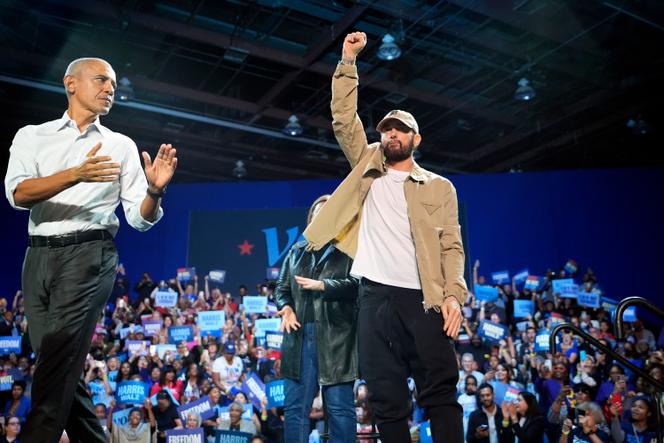


With 10 days to go before the US election, rapper Eminem took to a stage in Detroit, Michigan, to perform his 2010 track "Not Afraid." He wasn't at a concert but at a rally in a Democratic stronghold crucial to the election. Proclaiming his love for Kamala Harris, he said, "I also think that people shouldn't be afraid to express their opinions." Nor should they be afraid of "retribution."
Eminem's words are not insignificant in terms of how the American cultural world is positioning itself during this election. The forces at play aren't new. From one election to the next, the vast majority of the music and film world, with its share of stars targeting undecided voters (though not writers, painters or orchestral soloists), tends to favor the Democrats.
Alongside major stars like Meryl Streep, Ben Stiller and George Clooney – who played a role in Joe Biden's campaign withdrawal – stand dozens of other names, including Beyoncé, Ariana Grande, Jennifer Lawrence, Julia Roberts, Usher, Billie Eilish, Robert De Niro, Jennifer Lopez and Lizzo. Bruce Springsteen also joined in, appearing with Harris on October 24 in Atlanta, Georgia, and is scheduled to perform for her on October 28 in Philadelphia, Pennsylvania.
On the other side of the fence, as usual, the support is sparse. Beyond the familiar faces like Clint Eastwood and Kanye West, or even Dennis Quaid, the celebrities are mostly national or local figures. To compensate, on October 14, at a rally in Pennsylvania, Trump didn't hesitate to cut short questions at an event and dance on stage to his playlist, which featured Elvis Presley, Guns N'Roses and "YMCA" by the Village People.
And yet something has changed since 2016, when Trump beat Hillary Clinton. Back then, Clinton had a record number of celebrities backing her, hurling insults toward the enemy, calling him a bully, filthy, racist, pig, clown and psychopath. De Niro said he wanted to smash his face in. Trump could portray himself as a victim, reinforcing his narrative of defending everyday Americans against the wealthy elite of Hollywood, which contributed to his victory. It could, therefore, be said that celebrity endorsements don't guarantee a win, but their verbal outrageousness can make you lose. A double whammy.
Harris has fewer endorsements than Clinton, or at least they're staying more discreet. The focus now is more on praising her rather than insulting her opponent. As a result, as the newspaper Le Parisien wrote on October 23, Hollywood, a Democratic stronghold, is experiencing "the return of silent cinema."
You have 54.23% of this article left to read. The rest is for subscribers only.
